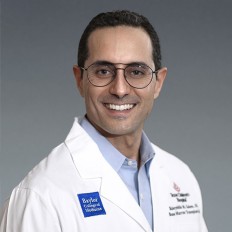Bringing Leukemia Research to the Bedside: Texas Children’s Cancer and Hematology Center’s Leukemia Program


As one of the largest programs of its kind in the country, the breadth, depth and expertise of Texas Children’s Cancer and Hematology Center’s Leukemia Program is unmatched. The program provides a comprehensive approach to the study and treatment of leukemia. Services span a wide range, including in-depth laboratory-based molecular studies of leukemia biology and translation of laboratory discoveries; clinical trials of novel targeted agents and cellular immunotherapies; investigation of strategies for mitigation of late effects in long-term survivors; and epidemiologic studies of health disparities in survival and treatment-related toxicities.
Breakthroughs in leukemia research have led to the identification of new leukemia subtypes, which has increased our ability to more effectively treat children and adolescents with leukemia.

“We now know that certain leukemia subtypes respond better to specific drugs or drug combinations,” said Program Director Karen Rabin, MD, PhD, pediatric oncologist. “Therefore, a primary focus of our care is to use precision medicine strategies to best characterize each child’s leukemia with a goal of attaining remission and subsequent cure.”
The Leukemia Program sees approximately 120 new patients each year and enrolls the majority on clinical trials. “We are committed to offering clinical trial enrollment to all consenting patients who are eligible, and we are fortunate to have trials available for the majority of our patients,” Dr. Rabin said. “Data show that outcomes are better for children with cancer who are enrolled on therapeutic clinical trials.”
The Leukemia Program is dedicated to integrating laboratory science with clinical research to increase the understanding of leukemia biology and to develop new, more effective therapies for the disease. The program is unique in its concentration of nationally and internationally recognized leaders in the areas of new drug development, cell and gene therapy, and the design and implementation of both local and national clinical trials. Texas Children’s Cancer and Hematology Center is one of the largest centers in the National Cancer Institute (NCI)-funded Children’s Oncology Group (COG), the largest consortium devoted exclusively to childhood and adolescent cancer research and treatment. The Leukemia Program’s faculty hold leadership positions on multiple COG committees, as well as the Therapeutic Advances in Childhood Leukemia & Lymphoma (TACL) consortium, an organization focused on studies of investigational agents for relapsed disease.
“Our faculty are overseeing and leading numerous national clinical trials,” Dr. Rabin said. “That reflects our tremendous expertise in the field. We readily translate discoveries from the laboratory to inform our clinical approach and offer the most cutting-edge treatments to our patients.”


A highly anticipated investigator-initiated clinical trial led by Nabil Ahmed, MD, and Bahey Salem, MD, that will be activated soon is TriCAR, a CAR-T cell trial in which the T cells are directed against CD19, CD20 and CD22 antigens. This trial, which utilizes innovative and unique cell engineering techniques, will be the first to target three different B-ALL antigens. This novel immunotherapy will provide an important treatment option for children and young adults who experience refractory or progressive disease after treatment with current CD19-targeting CAR products.

In preclinical work aimed at developing additional novel, targeted therapies, the Leukemia Program at Texas Children’s Cancer and Hematology Center has developed the country’s largest Acute Myeloid Leukemia (AML) Patient Derived Xenograft (PDX) Core, led by Alexandra Stevens, MD, PhD. These PDX models are used to identify, validate and prioritize targeted therapies against childhood AML. Since its inception, the core has been increasingly utilized by researchers locally and nationally to test new agents to improve outcomes in AML.
Another major research focus of leukemia research at the Cancer and Hematology Center is understanding disparities in outcomes among Latino children and adolescents with acute lymphoblastic leukemia (ALL) in order to mitigate these disparities. These efforts are led by Dr. Rabin and Philip Lupo, PhD, Director of the Epidemiology Program at Texas Children’s Cancer and Hematology Center, who are principal investigators for a $3.2 million multi-center program planning grant from the NCI. This award is designed to build the foundation for a larger Specialized Programs of Research Excellence (SPORE) grant that, if successful, will be the first devoted to pediatric leukemia. The multi-center research consortium, comprised of six leading pediatric cancer centers in the United States, is actively collecting clinical data as well as samples of bone marrow, blood and cerebrospinal fluid from a racially and ethnically diverse cohort of nearly 2,000 children and adolescents with ALL.


Additionally, Monica Gramatges, MD, PhD, Co-Director of the Long-Term Survivor Program, and David Poplack, MD, Director of the Global Hematology-Oncology Pediatric Excellence Program, were recently awarded a $1 million grant from the Cancer Prevention & Research Institute of Texas to leverage Passport for Care®, an interactive website for long-term survivors of childhood cancer and their caregivers, to reduce childhood cancer survivorship outcome disparities in the Rio Grande Valley. Passport for Care was developed by Dr. Poplack, in collaboration with the COG, to provide individualized screening guidelines and resources based on a survivor’s treatment history.
“We have a strong culture of research at Texas Children’s Cancer Center and believe in the value that scientific research can bring to our patients,” Dr. Rabin said. “We’re able to support children and their families from anywhere—locally, nationally or internationally.”
Learn more about Texas Children’s Cancer Center’s Leukemia Program. You can also refer a patient online or call 1-800-226-2379.